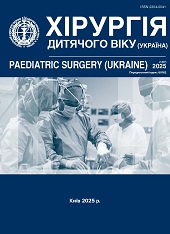Retrospective analysis of the course of ulcerative necrotizing enterocolitis in newborns (clinical cases)
DOI:
https://doi.org/10.15574/PS.2025.2(87).110117Keywords:
сhildren, necrotizing enterocolitis, diagnosis, treatment strategiesAbstract
Ulcerative-necrotizing enterocolitis (NEC) is one of the leading causes of mortality and urgent surgical interventions in the neonatal period. Improving diagnostic and treatment approaches for this condition remains an important and relevant objective to enhance clinical outcomes.
Aim - to analyze the clinical course, diagnostic approaches, and treatment strategies for newborns with ulcerative-necrotizing enterocolitis based on retrospective analysis and selected clinical case reviews.
Materials and methods. The analysis included data from 138 newborns with NEC who were treated at the departments during the period from 2013 to 2023. Of these, 34 (24.6%) underwent surgical intervention, and these cases were analyzed in more detail. A review of clinical cases of NEC in newborns was conducted. General clinical, laboratory, instrumental, histological, and statistical methods were used in the study.
Results. Among the 138 infants with NEC, 104 (75.4%) patients with the stage I or II received conservative treatment, while 34 (24.6%) underwent surgical intervention. A total of 25 infants (18.1%) died. The majority of the operated patients had the stage IIIA NEC (52.9%) or the stage IIIB NEC (41.2%). In 94.1% of the operated cases, the gestational age was less than 36 weeks, and in 79.4% the birth weight was under 2000 grams. The main laboratory findings in the stage IIIB NEC included elevated leukocytosis, anemia, decreased protein and albumin levels, and increased urea levels. Ultrasound and radiographic imaging confirmed the diagnosis and associated complications. Bacteriological monitoring revealed pathogenic microflora in 85.7% of patients with the stage IIIB NEC. The main surgical interventions included laparocentesis, laparoscopy, and laparotomy. Postoperative mortality was 23.5%. Two clinical cases of NEC were reviewed, highlighting several debatable management aspects.
Conclusions. Necrotizing enterocolitis (NEC) remains a severe complication of the neonatal period, requiring a multidisciplinary approach to diagnosis and treatment. The presented clinical cases demonstrate the necessity of an individualized approach to managing patients with NEC. There is no universal surgical strategy for treating NEC, further research is needed, particularly regarding the impact of maternal COVID-19 infection during pregnancy on newborns, especially concerning hemostatic disorders.
This study was conducted in accordance with the principles of the Declaration of Helsinki. The study protocol was approved by the local ethics committee of the institution. Informed consent was obtained from all patients.
The authors declare no conflict of interest.
References
Chornopyshchuk NP. (2019). Kliniko-diahnostychnyi osoblyvosti nekrotychnoho enterokolitu peredchasno narodzhenykh ditei. Dissertation for obtaining the scientific degree of Candidate of Medical Sciences. 14.01.10 - Pediatrics (22 Health Care). National Pirogov Memorial Medical University, Vinnytsya, Ukraine.
Eaton S. (2017). Necrotizing enterocolitis symposium: Epidemiology and early diagnosis. J Pediatr Surg. 2(52): 223-225. https://doi.org/10.1016/j.jpedsurg.2016.11.013; PMid:27914586
Ibáñez V, Couselo M, Marijuán V et al. (2012). Could clinical scores guide the surgical treatment of necrotizing enterocolitis? Pediatric Surgery International. 28: 271-276. https://doi.org/10.1007/s00383-011-3016-z; PMid:22002167
Kastenberg ZJ, Sylvester KG. (2013). The surgical management of necrotizing enterocolitis. Clinical Perinatology. 40: 135-148. https://doi.org/10.1016/j.clp.2012.12.011; PMid:23415269
Khalil A, Kalafat E, Benlioglu C et al. (2020). SARS-CoV-2 infection in pregnancy: A systematic review and metaanalysis of clinical features and pregnancy outcomes. Clinical Medicine. 25: 100446. https://doi.org/10.1016/j.eclinm.2020.100446; PMid:32838230 PMCid:PMC7334039
Martin R, Fanaroff Avroy A, Walsh MC. (2011). Neonatal Necrotizing Enterocolitis: Clinical Observations, Pathophysiology and Prevention. Neonatal-Perinatal Medicine. Disease of Fetus and Infant. 2: 1431-1442.
Mavropulo TK, Makhedonskyi IO. (2014). Necrotizing enterocolitis in newborns (from the principles of evidence-based medicine). Neonatology, surgery, and perinatal medicine. 4; 3: 116-126. https://doi.org/10.24061/2413-4260.IV.3.13.2014.19
Ministry of Health of Ukraine. (2022). "Necrotizing Enterocolitis in Preterm Newborns". Unified Clinical Protocol of Secondary (Specialized) and Tertiary (Highly Specialized) Medical Care Kyiv. Order of the Ministry of Health of Ukraine dated January 28, 2022 No. 182.
Müller MJ, Paul T, Seeliger S. (2016). Necrotizing enterocolitis in premature infants and newborns. J. Neonatal Perinatal Med. 9: 233-242. https://doi.org/10.3233/NPM-16915130; PMid:27589549
Okhmatdytivski Readings (2024). Materials of the scientific-practical conference with international participation "Okhmatdytivski Readings - 2024", Kyiv.
Pereyaslov AA, Borys OYa. (2017). Improvement of diagnostics and surgical treatment of necrotizing enterocolitis in newborns. Paediatric surgery. Ukraine. 2(55): 78-85. https://doi.org/10.15574/PS.2017.55.76
Polish Society of Neonatologists. (2015). Standards of Medical Care for Newborns in Poland. Recommendations of the Polish Society of Neonatologists.
Rusak PS, Laponoh SP, Vaisberg YR, Serheiko IA, Morenets LI et al. (2016). Vyznachennya markeriv rozvytku nekrotyzuyuchoho enterokolitu v umovakh oblasnoho perynatalnoho tsentru. Neonatology, surgery and perinatal medicine. VI; 3(21): 19-24.
Yablon OS, Chornopyshchuk NP, Rusak PS, Konoplytska AP. (2022). Necrotizing enterocolitis in preterm newborns who died: causes, risk factors of mortality, histological changes in the intestinal wall. Paediatric surgery. Ukraine. 1(74): 70-78. https://doi.org/10.15574/PS.2022.74.70
Downloads
Published
Issue
Section
License
Copyright (c) 2025 Paediatric Surgery (Ukraine)

This work is licensed under a Creative Commons Attribution-NonCommercial 4.0 International License.
The policy of the Journal “PAEDIATRIC SURGERY. UKRAINE” is compatible with the vast majority of funders' of open access and self-archiving policies. The journal provides immediate open access route being convinced that everyone – not only scientists - can benefit from research results, and publishes articles exclusively under open access distribution, with a Creative Commons Attribution-Noncommercial 4.0 international license(СС BY-NC).
Authors transfer the copyright to the Journal “PAEDIATRIC SURGERY.UKRAINE” when the manuscript is accepted for publication. Authors declare that this manuscript has not been published nor is under simultaneous consideration for publication elsewhere. After publication, the articles become freely available on-line to the public.
Readers have the right to use, distribute, and reproduce articles in any medium, provided the articles and the journal are properly cited.
The use of published materials for commercial purposes is strongly prohibited.

